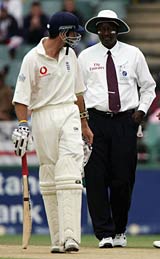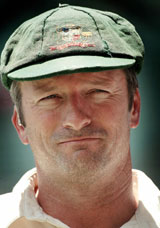Winning ugly is all right by England
Are England really tougher opposition than the Australians?
Andrew Miller
09-Jun-2005
|
|

|
In the aftermath of a thumping second-Test defeat, Bangladesh's captain, Habibul Bashar was barely audible as he mumbled his way through the obligatory post-match post-mortem. One utterance, however, did ring out loud above the rest. England, he declared, had proved tougher opposition than even the Australians.
Now it is easy to make such sweeping judgments when your team has just surrendered a Test series in less than six days, and there are many teams better placed to assess England's credentials than Bangladesh. But there was little cause to doubt the veracity of Bashar's claim either. He has been at the sharp end ever since their maiden Test in November 2000, and rarely can he have encountered a team with such a chilling thousand-yard stare.
Under Duncan Fletcher, England have become accustomed to talking of "the bubble", the protective team environment that nurtures those in the know and alienates outsiders. Bangladesh, betrayed by an unfortunate itinerary that placed them right in the firing line of an Ashes showdown, fell all too dramatically into the second camp. With the entire country focused on one single date, July 21, they were brushed aside with the sort of functional machismo that is normally reserved for extras in a kung-fu movie.
England simply couldn't give two hoots about the contest. They were content to use just five batsmen all series, even though the sixth, Andrew Flintoff, was theoretically in need of time in the middle after his ankle operation. And they were content to win ugly as well, as evidenced by Geraint Jones's bump-ball episode in Durham. Australia have a keen eye on their public image these days, and would surely have used the confusion as an opportunity for some good PR. Not England. Nafees Iqbal had been a fly in their ointment during Bangladesh's first decent stand of the series, and they had simply become bored of his insolence.
Bangladesh thought they had it tough when they went to Australia in July 2003, but it was a schoolmasterly type of toughness that they encountered, not this sort of bully toughness. For starters, there were several qualitative differences between the two occasions. Back then, it was Australia's off-season and the novelty value of Test cricket at Darwin and Cairns leant the trip a certain festival feel - not least when the starry-eyed Bangladeshis cued for Steve Waugh's autograph, after he had taken 256 magisterial runs from them in two unbeaten innings. Seven of the players remained from that series, older by 23 months and wiser to the tune of 17 Tests, but it is only now that have they been dealt a truly Australian-style thrashing.
|
|

|
Aping all things Australian is the current craze in international cricket, but England, for obvious cultural reasons, are the only team who can create a perfect imitation. And so far, they have got the act down to a tee. First came Nasser Hussain's dictatorial era, twinned with the Academy, which moulded a clutch of battle-hardened veterans. Then, personified by Flintoff, came the ethos of "mateship" that has been so pivotal to Australia's successes since the days of Doug Walters. Now, at last, under Michael Vaughan's uncompromising leadership, comes the sadistic streak.
Naturally, it comes at a cost. Just as Allan Border was forced to sever his chummy ties with the likes of Gower and Botham in 1989, so Vaughan came in for some choice Afrikaans criticism this winter, as South Africa's players spotted the chilly focus descending. "In 2003, he was genuinely likeable and there was respect on both sides," one was reported as saying in The Observer. "Now he's just a genuine ..." Clive Lloyd, the ICC match referee who fined Vaughan for his comments on the umpiring at Johannesburg, added to that image by branding him "dismissive and rude". But if his new attitude brings home the Ashes this summer, as it did for Border in '89, Vaughan will be entitled to retort: "so ****ing what?"
It is tempting to suggest that metamorphosis is working both ways, for these days it is Australia who are careful to mind their Ps and Qs on the field and respect their tradition off it. That, of course, cannot be judged until this summer's contest is over, but all through the Bangladesh series - and even, to a certain extent, in South Africa - England have only had eyes for the big boss.
That in itself is a vast improvement on the recent Ashes experience. England are accustomed to making lots of noise about being up for the challenge, but have invariably gone into the opening Test with eyes averted and body braced for a colossal fall -Hussain's infamous decision to bowl first at Brisbane remains the classic example of a captain pulling his punches. The one exception came in the first Test of 1997, and Australia were seriously rattled after that momentous defeat. But in those ad-hoc days before central contracts, England lacked the cohesion to capitalise.
There is no danger of that scenario arising again, for England are a team moulded in the image of their captain, a man who has known only spectacular personal success against the Australians. In 2002-03 Vaughan slugged it out toe-to-toe with Glenn McGrath, rattling up three big hundreds and 633 runs in the series. He has no fear, and has even hastened his re-acquaintance with McGrath by stepping up to No. 3 in the order.
"If you get too cute with the game it tends to come back and bite you." That could almost be Border or Waugh talking, but it has in fact become Vaughan's mantra. The flinty gaze is fixed in place, and he is turning himself into one hard bastard. Only time will tell if the imitation is flattering or flattery.
Andrew Miller is UK editor of Cricinfo